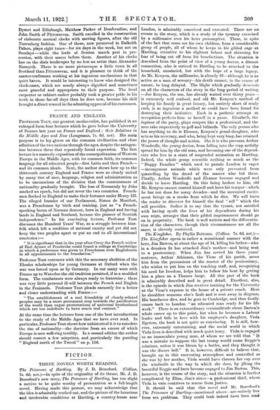FRANCE AND ENGLAND.
PROFESSOR TOUT, our greatest mediaevalist, has published in an enlarged form four lectures which he gave before the University of Rennes last year on France and England : their Relations in the Middle Ages and Now (Longmans, 75. 6d. net). His main purpose is to lay 46ress on the common civilization and close
affinities of the two nations through the ages, despite the antagon- ism between them that repeatedly found expression. The first lecture is a masterly exposition of the cosmopolitanism of Western Europe in the Middle Ages, with its common faith, its common language for all educated people—first Latin and then French— and its common ideals. Next, the author shows how up to the thirteenth century England and France were so closely united by many ties of race, language, religion and administration as to be unconscious of the division that the consciousness of nationality gradually brought. The loss of Normandy by John marked an epoch, but did not sever the two countries. French- men flocked to England to make their fortunes under Henry III. The alleged founder of our Parliament, Simon de Montfort, was a Frenchman by birth and training, just as "a French- speaking baron of Norman descent, born in England and having lands in England and Scotland, became the pioneer of Scottish independence." In his concluding lecture, Professor Tout discusses the Hundred Years' War, as a struggle between kins- folk which left a tradition of national enmity and yet did not keep the two peoples apart or put an end to all international courtesies :—
" It is significant that in the year after Crecy the French widow of Earl Aymer of Pembroke could found a college at Cambridge in which a preference was given to Frenchmen over Englishmen In all appointments to the foundation."
Professor Tout contrasts with this the necessary abolition of the Rhodes scholarships for young Germans at Oxford when the
war was, forced upon us by Germany. In our many wars with France up to Waterloo the old tradition persisted, if in a modified form. The combatants were always ready to fraternize ; there was very little personal ill-will between the French and English in the Peninsula. Professor Tout pleads earnestly for a better and closer understanding with France :—
"The establishment of a real friendship of closely-related peoples may be a more permanent step towards the pacification of the world than vague protestations of universal brotherhood which are too indefinite to have much real content."
At the same time the lectures form one of the best introductions to the study of the Middle Ages that we have ever read. In particular, Professor Tout shows how unhistorical it is to antedate the rise of nationality—the doctrine from an excess of which Europe is now suffering terribly. In a second edition the author should correct a few misprints, and .particularly the puzzling "England north of the Tweed" on p. 116.


































 Previous page
Previous page